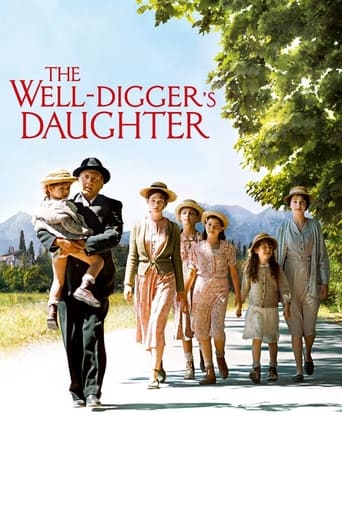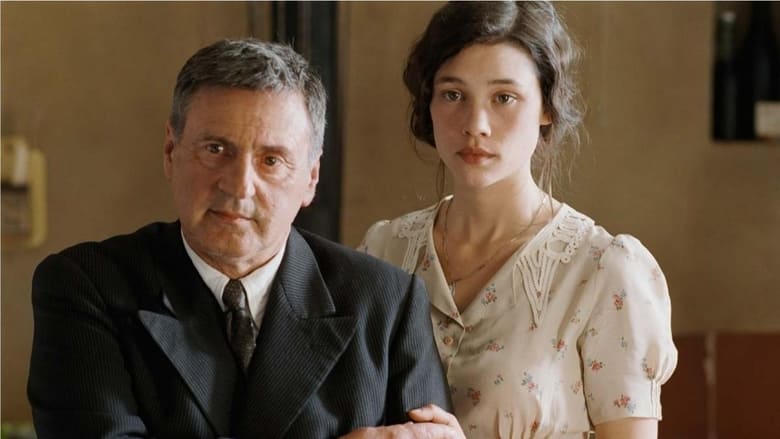

The Well Digger's Daughter (2011)
It's the beginning of the WWII. South of France. Patricia, 18, is the oldest daughter of a well-digger, Pascal, who considers her a princess because of her moral qualities. She's kind, devoted. One day, she briefly meets a young man, Jacques, the son of Mazel, owner of the shop where her father buy his material. He's handsome and teasing. Her father's friend, Felipe, would love to marry her, and he invites her to an aviation show. She accepts his invitation only because she knows Jacques is a pilot and will be there. Soon, she'll carry his child, and he'll be gone, and the family will have to deal with this out-of-wedlock pregnancy...
Watch Trailer
Cast
Reviews
From my favorite movies..
Brilliant and touching
I wanted to like it more than I actually did... But much of the humor totally escaped me and I walked out only mildly impressed.
This story has more twists and turns than a second-rate soap opera.
(I never saw the original.) This story is probably too dated for young viewers uninterested in the morality of a bygone age (though it should make us all thrilled those days are dead, dead, dead).The film is certainly gorgeous to look at. Costumes, the countryside, even the old cars, all beautiful. Most of the acting is great except for the female lead who has only one expression--sad with optional tears. If she's lustful, hopeful, worried, offended, the face stays in that one expression. It becomes wearying then frustrating and makes her less "beautiful" with every frame. (I was reminded of Kristen Stewart biting her lip all the danged time.) Perhaps she was trying to play the girl as mildly retarded (which could be--she certainly was rather an idiot at every turn), but whyever this choice, it didn't work for me, and a viewer's belief in her attractiveness and "goodness" (doormattishness) is crucial to make the story work.In the end, this movie is a big "so what?" to me. The story has been told before, it's hopelessly outdated, and it adds nothing to our understanding of human nature. It's not a happy ending seen through my world view. The mother-in-law gets away with horrors that suggest the rest of the young couple's life will also be hellish because of her. And the "I'll take you as a consolation prize" ending for the sister and soldier is equally as horrifying to contemplate.
Awarding-winning actor Daniel Auteuil made his directorial debut, remaking this story of The Well-Digger's Daughter, set in a small countryside village of France just before a war. I'm not sure, but I think it's WWII. He is the well-digger and he has a late teens/young-20ish daughter who is the apple of his eye. Daniel's partner in well-digging likes her very much, despite the age difference. The plot thickens when she makes an instant liking to a boy, of her own age, when he helps her across a river. They don't know who each other are, but he figures out who she is before she him. He's the son of the rich shopkeeper. The boy volunteers for the war effort, and the obvious events happen to the young girl only after he's gone. In fact, this plays out very predictably like a Hallmark movie and the setting could very well be any small town in early 20th century America with its small town thinking, like The Magic of Ordinary Days, which I loved by the way. The plot may be predictable, but what makes this film stand out is the director's obvious love of the time, the place and story. The people are real. The landscape is beautiful. The mood and laid-back treatment is right on track to make this otherwise average film a very moving experience and love story.
We were lucky enough to view this marvelous French film yesterday in Fremantle and both of us were touched by the simple story of boy meets girl; girl has his child but things turnout well in the end. The conflicting problems are the unspoken classism of France in those early WW I years that more obviously exist in England but are relatively unknown in France. Some negative commentators spoke from a Feminist perspective about the girl being only a cardboard figure without substance but from our point of view those considerations were unimportant given the beauty of the cinematography and the relative newness of the unfolding story (that is, how the various people played their roles at that time in French history.) We were not prepared to rubbish the film because of modern concerns; the actions of the characters all made sense to us and we considered them to be one example from a plethora of similar timeless actions. Perhaps the only fault that could be drawn was that the ending seemed rather more pat than reality would have allowed in those days.The actors played their roles beautifully and the nuances of the script were delightful in their unfolding. There were many insights (to me as a foreigner) into life at that time in France and as a result I am not prepared to make any negative comments about the story nor the script. We thought it was a beautiful film and well-worth the time and expense to see it.
Superficially this is chocolate-box romance. It is set in beautiful countryside in a world of constant summer. Even though it takes place over a year there is continuous warm sunshine.The story centres on the well-digger, Pascal: the daughter, Patricia, is a cipher, without personality, with no voice, and seemingly incapable of independent action. Does anyone really want to see this kind of woman in fiction or in life? Pascal is well-drawn; he is self-centred, a martinet, a hypocrite, unwilling to listen to anyone, and actually rather stupid. He is also crude- he comments on his dead wife's sexuality to his employee.At the opening of the film the daughter is described as universally liked because of her kindness. Of course she is kind. She is looking for affection and love after being sent from her home and mother at a very young age. You can imagine Pascal forcing his wife to accept this- 'in the interests of the child' of course. If the baby had been a boy... The daughter is only allowed back because circumstances force her return.How to explain her easy seduction by an unsuitable youth after one brief meeting? Obviously she is looking for love at any cost.Pascal tries to reach a deal with the youth's parents. No chance. He immediately disowns her. He casts her out (Victorian tyrant!) and only pretends to kiss her goodbye to deceive his other daughters. Yet it would have been better for everyone is she had stayed at home.Months pass. Still summer though! He destroys unread a letter from her. Then he goes to visit her. The first thing he does is to pretend to drown the baby. What a joke! This terrifies her, but she says nothing, and he shows no shame at his cruel stupidity.He soon wants to take over the baby (because it is a longed-for boy, presumably). She accepts this. She is a doormat throughout.The youth has made only one very feeble attempt to find the girl. Yet they agree to get married. Only after he has been killed in a blazing plane and found alive unharmed. What a load of rubbish.At the altar he says he doesn't want to marry. Only a joke! She believes him, but no recrimination from her for his brutal insensitivity.There are equally daft subplots, for example with the second daughter having an unaccountable passion for the daughter's castoff. This reults in an off-on-off probably-on relationship.It is well acted throughout. And it is pretty.Incidentally there is a war on, but everyone ignores it.


